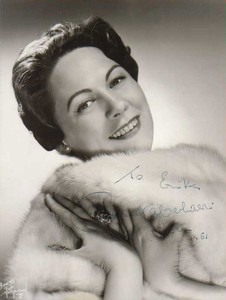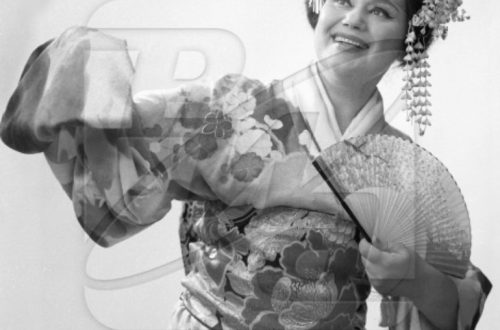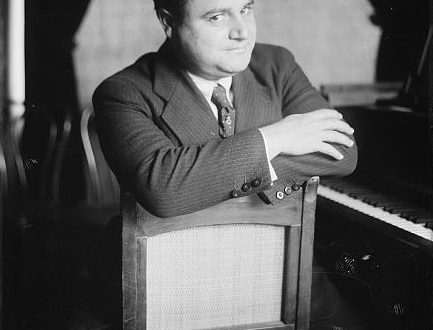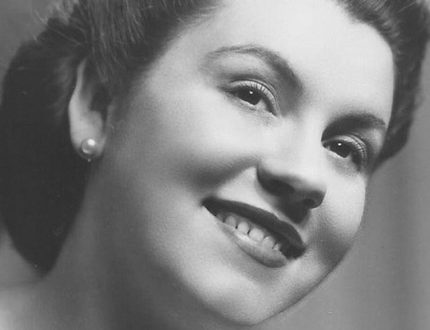
Renata Tebaldi (Renata Tebaldi) |
Renata Tebaldi

To anyone who heard Tebaldi, her triumphs were no mystery. They were explained, first of all, by outstanding, downright unique vocal abilities. Her lyric-dramatic soprano, rare in beauty and strength, was subject to any virtuoso difficulties, but equally to any shades of expressiveness. Italian critics called her voice a miracle, emphasizing that dramatic sopranos rarely achieve the flexibility and purity of a lyric soprano.
Renata Tebaldi was born on February 1, 1922 in Pesarro. Her father was a cellist and played in small opera houses in the country, and her mother was an amateur singer. From the age of eight, Renata began to study the piano with a private teacher and promised to become a good pianist. At the age of seventeen, she entered the Pesar Conservatory in piano. However, soon experts drew attention to her outstanding vocal abilities, and Renata began to study with Campogallani at the Parma Conservatory already as a vocalist. Further, she takes lessons from the famous artist Carmen Melis, and also studies opera parts with J. Pais.
On May 23, 1944, he made his debut in Rovigo as Elena in Boito’s Mephistopheles. But only after the end of the war, Renata was able to continue performing at the opera. In the 194546 season, the young singer sings in the Parma Teatro Regio, and in 1946 she performs in Trieste in Verdi’s Otello. That was the beginning of the brilliant path of the artist “The Song of the Willow” and Desdemona’s prayer “Ave Maria” made a great impression on the local public. Success in this small Italian town gave her the chance to perform at La Scala. Renata was included in the list of vocalists presented by Toscanini during his preparation for the new season. In Toscanini’s concert, which took place on the stage of La Scala on the significant day of May 11, 1946, Tebaldi turned out to be the only soloist, previously unfamiliar to the Milanese audience.
The recognition of Arturo Toscanini and the huge success in Milan opened wide opportunities for Renata Tebaldi in a short time. “La divina Renata”, as the artist is called in Italy, became a common favorite of European and American listeners. There was no doubt that the Italian opera scene was enriched with an outstanding talent. The young singer was immediately accepted into the troupe and already in the next season she sang Elisabeth in Lohengrin, Mimi in La Boheme, Eve in Tannhäuser, and then other leading parts. All subsequent activities of the artist were closely connected with the best theater in Italy, on the stage of which she performed year after year.
The biggest achievements of the singer are associated with the La Scala theater – Marguerite in Gounod’s Faust, Elsa in Wagner’s Lohengrin, central soprano parts in La Traviata, The Force of Destiny, Verdi’s Aida, Tosca and La Boheme. Puccini.
But along with this, Tebaldi successfully sang already in the 40s in all the best theaters in Italy, and in the 50s – abroad in England, the USA, Austria, France, Argentina and other countries. For a long period, she combined her duties as a soloist at La Scala with regular performances at the Metropolitan Opera. The artist collaborated with all the major conductors of her time, gave many concerts, and recorded on records.
But even in the mid-50s, not everyone admired Tebaldi. Here is what you can read in the book of the Italian tenor Giacomo Lauri-Volpi “Vocal Parallels”:
“Being a special singer, Renata Tebaldi, using sports terminology, runs the distance alone, and the one who runs alone always comes to the finish line first. She has neither imitators nor rivals … There is no one not only to stand in her way, but even to make her at least some semblance of competition. All this does not mean an attempt to belittle the dignity of her vocals. On the contrary, it can be argued that even the “Song of the Willow” alone and the prayer of Desdemona following it testify to what heights of musical expression this gifted artist is able to achieve. However, this did not prevent her from experiencing the humiliation of failure in the Milan production of La Traviata, and just at the moment when she imagined that she had irrevocably captured the hearts of the public. The bitterness of this disappointment deeply traumatized the soul of the young artist.
Fortunately, very little time passed and, performing in the same opera at the Neapolitan theater “San Carlo”, she learned the weakness of triumph.
Tebaldi’s singing inspires peace and caresses the ear, it is full of soft shades and chiaroscuro. Her personality is dissolved in her vocals, just like sugar dissolves in water, making it sweet and leaving no visible traces.
But five years passed, and Lauri-Volpi was forced to admit that his past observations needed substantial corrections. “Today,” he writes, “that is, in 1960, Tebaldi’s voice has everything: it is gentle, warm, dense and even throughout the entire range.” Indeed, since the second half of the 50s, Tebaldi’s fame has been growing from season to season. Successful tours in the largest European theaters, the conquest of the American continent, high-profile triumphs at the Metropolitan Opera … Of the parts performed by the singer, the number of which is close to fifty, it is necessary to note the parts of Adrienne Lecouvreur in the opera of the same name by Cilea, Elvira in Mozart’s Don Giovanni, Matilda in Rossini’s Wilhelm Tell, Leonora in Verdi’s The Force of Destiny, Madame Butterfly in Puccini’s opera, Tatiana in Tchaikovsky’s Eugene Onegin. The authority of Renata Tebaldi in the theatrical world is indisputable. Her only worthy rival is Maria Callas. Their rivalry fueled the imagination of opera fans. Both of them have made a grandiose contribution to the treasury of the vocal art of our century.
“The irresistible power of Tebaldi’s art,” emphasizes the well-known expert in vocal art V.V. Timokhin – in a voice of exceptional beauty and power, unusually soft and tender in lyrical moments, and in dramatic episodes captivating with fiery passion, and, moreover, in a wonderful technique of performance and high musicality … Tebaldi has one of the most beautiful voices of our century . This is a truly wonderful instrument, even the recording vividly conveys its charm. Tebaldi’s voice delights with its elastic “sparkling”, “sparkling” sound, surprisingly clear, equally beautiful both in fortissimo and in magical pianissimo in the upper register, and with the length of the range, and with a bright timbre. In episodes filled with strong emotional tension, the artist’s voice sounds just as easy, free, and at ease as in a calm, smooth cantilena. Its registers are of equally excellent quality, and the richness of dynamic shades in singing, excellent diction, masterful use of the entire arsenal of timbre colors by the singer further contribute to the huge impression she makes on the audience.
Tebaldi is alien to the desire to “shine with sound”, to demonstrate the specifically “Italian” passion of singing, regardless of the nature of the music (which even some prominent Italian artists often sin). She strives to follow good taste and artistic tact in everything. Although in her performance there are sometimes insufficiently felt “common” places, on the whole, Tebaldi’s singing always deeply excites the listeners.
It is hard to forget the intense sound build-up in the monologue and the scene of farewell to her son (“Madama Butterfly”), the extraordinary emotional upsurge in the finale of “La Traviata”, the characteristic “fades” and the touching sincerity of the final duet in “Aida” and the soft, sad coloring of the “fading” in farewell Mimi. The individual approach of the artist to the work, the imprint of her artistic aspirations is felt in every part she sings.
The singer always had time to conduct an active concert activity, performing romances, folk songs, and many arias from operas; finally, to participate in the recording of operatic works in which she did not have a chance to go on stage; phonograph record lovers recognized in her the magnificent Madame Butterfly, never seeing her in this role.
Thanks to a strict regimen, she was able to maintain excellent shape for many years. When, shortly before her fiftieth birthday, the artist began to suffer from excessive fullness, in a few months she managed to lose more than twenty extra pounds of weight and again appeared before the public, more elegant and graceful than ever.
The listeners of our country met Tebaldi only in the autumn of 1975, already at the end of her career. But the singer lived up to high expectations, performing in Moscow, Leningrad, Kyiv. She sang arias from operas and vocal miniatures with conquering power. “The skill of the singer is not subject to time. Her art still captivates with its grace and subtlety of nuance, perfection of technique, evenness of sound science. Six thousand lovers of singing, who filled the huge hall of the Palace of Congresses that evening, warmly welcomed the wonderful singer, did not let her leave the stage for a long time, ”wrote the newspaper Sovetskaya Kultura.





